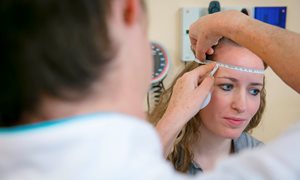
The Imagine Institute, a university hospital research center (Inserm, AP-HP, Université Paris Cité), also labeled Carnot Institute, will coordinate a project funded through Horizon Europe, the European Union's framework program for research and innovation for the period 2021-2027. Led by Sophie Saunier who is heading the Laboratory of Inherited Kidney disease at Institut Imagine, the project “Therapies for Renal Ciliopathies” (TheRaCil) has been selected in the call "Development of new effective therapies for rare diseases". This project brings together 16 partners (main interacting participants at 15 institutions in 6 countries) and 3 European consortia with the ambition to develop appropriate and targeted treatments for pediatric renal ciliopathies. TheRaCil will benefit from a European Commission funding of 7,425,446 euros and a co-funding of 540,520 euros from UK Research and Innovation (UKRI).
Development of effective new therapies for rare diseases: the case of renal ciliopathies
Renal ciliopathies are rare genetic diseases caused by dysfunction of the primary cilium, impacting tissue development and balance. Pediatric renal ciliopathies, including nephronophthisis (NPH) and autosomal recessive polycystic kidney disease (ARPKD), contribute to 15% of childhood chronic kidney disease (CKD) and often progress to end-stage kidney disease (ESKD), which poses significant challenges for patients, families, and healthcare systems. TheRaCil aims to address the urgent need for effective treatments for these conditions. TheRaCil project is a multidisciplinary consortium including clinicians, geneticists, biotechnology companies, and experts in complementary research fields such as cilia biology, bioinformatics, data science, and artificial intelligence (AI) along with patient advocacy groups. By leveraging the expertise of this consortia, TheRaCil aims to develop prognostic tools and therapies that can benefit most patients affected by renal ciliopathies.
A unique, interdisciplinary network to bring treatment to patients
The consortium's primary objective is to develop targeted therapies for pediatric renal ciliopathies, by proposing safe and effective solutions. One of the key strategies employed by TheRaCil is the integration of major European ciliopathy databases, which will provide access to a vast amount of clinical, biochemical, and genetic information from a diverse range of renal ciliopathy patients worldwide. This comprehensive dataset will enable researchers to better understand the disease mechanisms, identify potential therapeutic targets, and stratify patients based on specific characteristics.
A project focused on therapeutic innovation and clinical readiness
TheRaCil will utilize AI-based tools to analyze the collected data and identify dysregulated disease-associated pathways. This approach will facilitate the development of small molecules that target these pathways, as well as the exploration of antisense oligonucleotide (ASO) technology to rescue the expression of key proteins associated with renal ciliopathies. By employing a multi-parameter pipeline based on patient-derived materials and robust preclinical models, the project aims to identify and validate novel therapeutic options.
“TheRaCil aims to pave the way for the translation of preclinical findings into clinical trials. By establishing a large cohort of pediatric renal ciliopathy patients and utilizing AI-based tools, the project aims to identify eligible patients for specific treatments, thereby advancing the concept of precision medicine. The involvement of patient associations and the definition of relevant endpoints for future clinical trials will further enhance the readiness of these therapies for clinical implementation” Explains Sophie Saunier, coordinator of the project.
-
Want to know more about these subjects? Click on the buttons below for more news.
Related news items

Women more likely to develop mild variant Stargardt's disease
24 May 2024In the mild form of Stargardt's disease, an inherited eye disease, women are more likely to experience vision problems than men. This is shown in doctoral research by Stéphanie Cornelis.
go to page
Radboudumc participates in HiFi Solves, a Global Consortium of Clinical Genomics Research Leaders Aim to Share Best Practices and Increase the Understanding of Genetic Disease
22 November 2023HiFi Solves, a Global Consortium of Clinical Genomics Research Leaders including Radboudumc, is going to start
go to page
New Nijmegen method reveals hidden genetic variations Valuable data mining in the dark corners of the exome now possible worldwide
1 November 2023Many hidden genetic variations can be detected with Chameleolyser, a new method developed in Nijmegen.
go to page


